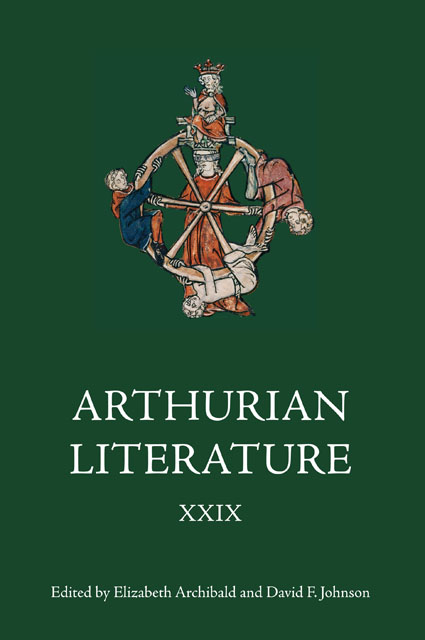Book contents
- Frontmatter
- Contents
- List of Illustrations
- General Editors’ Foreword
- List of Contributors
- I Edward III’s Abandoned Order of the Round Table
- II King Arthur’s Tomb at Glastonbury: The Relocation of 1368 in Context
- III Benedict of Gloucester’s Vita Sancti Dubricii: An Edition and Translation
- IV New Evidence for an Interest in Arthurian Literature in the Dutch Low Countries in the Fifteenth and Early Sixteenth Centuries
- V Malory’s Source-Manuscript for the First Tale of Le Morte Darthur
- VI Malory’s Sources – and Arthur’s Sisters – Revisited
- VII Peace, Justice and Retinue-Building in Malory’s ‘The Tale of Sir Gareth of Orkney’
- VIII Mapping Malory’s Morte: The (Physical) Place and (Narrative) Space of Cornwall
- IX The Fringes of Arthurian Fiction
- Contents of Previous Volumes
IX - The Fringes of Arthurian Fiction
Published online by Cambridge University Press: 14 February 2023
- Frontmatter
- Contents
- List of Illustrations
- General Editors’ Foreword
- List of Contributors
- I Edward III’s Abandoned Order of the Round Table
- II King Arthur’s Tomb at Glastonbury: The Relocation of 1368 in Context
- III Benedict of Gloucester’s Vita Sancti Dubricii: An Edition and Translation
- IV New Evidence for an Interest in Arthurian Literature in the Dutch Low Countries in the Fifteenth and Early Sixteenth Centuries
- V Malory’s Source-Manuscript for the First Tale of Le Morte Darthur
- VI Malory’s Sources – and Arthur’s Sisters – Revisited
- VII Peace, Justice and Retinue-Building in Malory’s ‘The Tale of Sir Gareth of Orkney’
- VIII Mapping Malory’s Morte: The (Physical) Place and (Narrative) Space of Cornwall
- IX The Fringes of Arthurian Fiction
- Contents of Previous Volumes
Summary
In 1980, Beate Schmolke-Hasselmann published her groundbreaking study Der arthurische Versroman von Chrétien bis Froissart. According to its subtitle, the monograph was devoted to the ‘Geschichte einer Gattung’ (the history of a genre) – an indication repeated in the main title of the splendid English translation of the work. Although The Evolution of Arthurian Romance suggests a broad treatment of Arthurian literature, Schmolke-Hasselmann’s discussion is in fact limited to French texts. This equation of Arthurian literature with French Arthurian literature has been, as is well known, a widespread phenomenon in international Arthurian scholarship until quite recently. Norris Lacy has termed this emphasis on French texts ‘scholarly “gallocentrism”’. The publications listed yearly in the Bibliographical Bulletin of the International Arthurian Society convey the impression that the concept of Arthurian literature awakens in the Arthurian community first and foremost associations with the corpus of French romances, and, to a lesser degree, with English and German texts.
While the dominance of scholarship on French narratives is understandable in the light of the position of French literature at the beginning of the genre’s history and the sheer size of the corpus, the particular interest devoted to English and German texts over the years can in all probability be explained, at least in part, by the vast number of scholars involved. It is certainly true, however, that the inclusion of Arthurian texts written in the many other medieval languages is a prerequisite for a more balanced view on the evolution of Arthurian romance in Europe. In recent years, Arthurian scholarship has clearly moved in this direction. A case in point is the ‘Arthurian Archives’ series, which since 1998 has overseen the publication of authoritative editions of medieval texts with facing English translation. Alongside volumes presenting French and German texts, the series currently includes Dutch, Italian, Latin and Scandinavian romances, making a substantial number of texts originating from the lesser known literatures accessible to a wide readership. Further clear signs of the growing interest in Arthurian corpora other than French, English and German texts are issues 21 (2004) and 24 (2007) of Arthurian Literature, which are devoted to the Irish and Welsh literature and the European dimensions of Arthurian literature respectively. Finally, the latest publications in the ‘Arthurian Literature in the Middle Ages’ series, which updates Loomis’s 1959 milestone, deserve mention.
- Type
- Chapter
- Information
- Arthurian Literature XXIX , pp. 191 - 242Publisher: Boydell & BrewerPrint publication year: 2012

